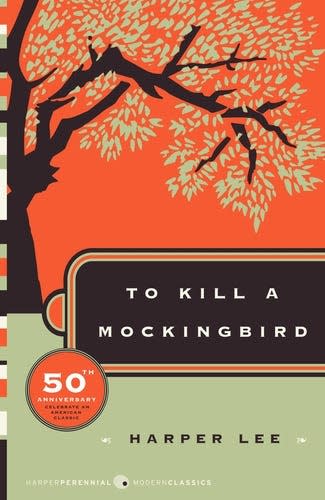Reclusive author Harper Lee spoke to the world through 'To Kill a Mockingbird'
- Oops!Something went wrong.Please try again later.
Sixty years ago, the Motion Picture Academy of Arts and Sciences awarded the film “To Kill a Mockingbird” three Oscars. Actor Gregory Peck (1916-2003) received an Oscar for Best Actor as Atticus Finch, the south Alabama lawyer who defends an African American man for raping a white woman in 1936. The film also won Oscars for Best Screenplay and Best Art Direction.
Alabama author Harper Lee, whose birthday is April 28, published “To Kill a Mockingbird: in July 1960. In 1961, Lee received the Pulitzer Prize for fiction. In 1962, the film version was released. In 1963, the film received many prestigious awards. Lee, 89, died in 2016. In 2018, the novel became a successful Broadway Play. Currently, the play tours nationally.

Harper Lee was a notorious recluse. In 2007, President George W. Bush awarded her the Presidential Medal of Freedom. In 2015, “Go Set a Watchman,” reportedly written by Lee in 1957, was published. The New York Times called the book a fraud based on Lee’s frail health, the death of her caregiver, and a possible profit motive by Lee’s then-attorney. Upon Lee’s death in 2016, President Barack Obama said she had “changed America for the better.”
Many readers, myself included, found reading “To Kill a Mockingbird” a profound experience during formative years. The novel’s leading male character is Atticus Finch, a single father to son Jem and daughter Scout. When Atticus decides to defend an African American man on charges of raping a white woman, the townspeople become enraged. Atticus explains his decision to Jem, ““I wanted you to see what real courage is, instead of getting the idea that courage is a man with a gun in his hand. It’s when you know you’re licked before you begin but you begin anyway, and you see it through no matter what. You rarely win, but sometimes you do.”
That quote may have been in Lee’s mind when her novel became a bestseller and a Pulitzer Prize winner. It was rare for a “country girl” from Alabama who had never written a book to receive such an honor. In 1960, a reviewer described Lee as an “iconoclast” with “an innate hatred of’ ’phoniness.’” She appears to have maintained those characteristics until the end of her life.
In 2022, Dr. Wayne Flynt, Ph.D., published “Afternoons with Harper Lee.” When Lee returned to Alabama, Flynt regularly called on her. The book details their conversations about Alabama, Lee’s 1960 book, the 1962 film, Lee’s relationships with, among others, author Truman Capote (1924-1984) and actor Gregory Peck. The book adds insight into the life of an esteemed writer, an “iconoclast” who enjoyed her privacy.
“To Kill a Mockingbird” is now banned at some schools due to its racist epithets. For example, Marshall University’s website says, the book is “available for individual reading and teachers can use [the book] with small groups after the teacher has undergone training on facilitating conversations on racism, implicit bias, and racial identity.“
Honors continue for Harper Lee. The U.S. Post Office plans a Forever stamp to honor the author. It is rumored that her statue may be placed in Statuary Hall in Washington, D.C. It is also rumored that a Hollywood biopic is being planned.
Whether you enjoy the book or the film, “To Kill a Mockingbird” is an important literary work. It was written about Alabama by an Alabamian during the height of the civil rights struggle in Alabama and our nation. It is a powerful work by the courageous and iconoclastic Harper Lee.

James Patterson is a life member of the Auburn University Alumni Association. and a Washington, D.C.-based writer and speaker.
This article originally appeared on Montgomery Advertiser: Author Harper Lee spoke to the world through 'To Kill a Mockingbird'

